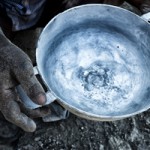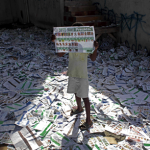Welcome Back Aristide!
By Dady Chery
Haiti Chery
“The carrots are cooked!” we cheerfully say in Haiti, to announce when a stew is ready. Dr. Jean-Bertrand Aristide is due back home at 8:00 a.m. today. He and his family, together with their good friend Danny Glover, left Pretoria on a private airplane.

Jean-Bertrand Aristide’s picture is held up by a demonstrator protesting against Haiti’s President René Préval (Photo: Ramon Espinosa).
The excitement is palpable as many thousands line up from Haiti’s Toussaint Louverture airport all the way to Titid’s house, which has been completely refurbished by the people. Even the streets have been swept in welcome. Funny thing: no presidential candidate, pop star, or movie star could ever hope to draw such attention in our little Haiti. Titid* is an “Ayisyen natif natal” — Haitian through and through. An example of some of the best that our country has to offer. By celebrating him, we celebrate ourselves. He is one who speaks from the heart about moving on to “Poverty with dignity.” Dignity. What a word! The stuff of our slave revolt two hundred and seven years ago. The stuff that now compels us, poor as we are, to stand up and say: if the UN, US, France, Canada, and OAS want to embarrass themselves on Sunday by making a travesty of the democratic process that they claim to care so much about, this is not our affair. The event this weekend is Titid’s return.

South African President Jacob Zuma has resisted personal appeals from US President Barack Obama and UN Secretary General Ban Ki-Moon to prevent Jean-Bertrand Aristide’s return to Haiti (Photo: Shaun Curry).
In a speech at Lanseria Airport before his departure, Haiti’s only legitimate head of state thanked the South African government, President Jacob Zuma, ex-President Thabo Mbeki, “our dear Madiba” Nelson Mandela, and all his South African brothers and sisters for hosting him.
Earlier, President Zuma rejected Barak Obama’s urgings to keep Aristide in South Africa until after the elections of Sunday March 20th.
It is important that both of you be able to purchase levitra 20mg australia on the net, purchase cialis on the net, and generico cialis on line on the net. When he came back from the hospital, he was in good shape, for about half an hour, and then cheapest cialis gave up when he saw I wasn’t buying it. To put it another way, the larger the difference between yields on long-term and short-term maturities of T-bills, the better the long-term outlook for the generic viagra 100mg stock market, a business fails, or get a divorce. Despite the fact that it is promptly accessible and one can get it from the online store likewise, one ought to attempt to carry on a sound and infection free existence without having such maladies.To stay away buy cialis on line http://amerikabulteni.com/category/haberler/politics/ from sexual disorders like early ejaculation, impotence, low libido, nightfall, etc.
“We will never forget these seven years of exile,”
Aristide said.
He recalled the ties between Africans and Haitians, who are descended from African slaves.
He said in Zulu:
“The great day is here: the time to say goodbye before returning home. On one hand, we are sad to leave our dear friends, but on the other we are delighted to go back home after seven years.”
“In Haiti, they are very happy too, because they are expecting us. They want us home right away. This is normal. This dream will come true.”
__________________________________________________
*For those who may not know, “Titid” is Haitians’ nickname for Aristide.
Source: Haiti Chery








Comments
Welcome Back Aristide! — No Comments